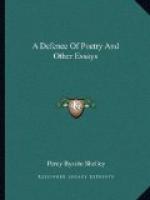that the intellectual and vital principle differs
in the most marked and essential manner from all other
known substances; that they have all some resemblance
between themselves which it in no degree participates.
In what manner can this concession be made an argument
for its imperishability? All that we see or know
perishes and is changed. Life and thought differ
indeed from everything else. But that it survives
that period, beyond which we have no experience of
its existence, such distinction and dissimilarity
affords no shadow of proof, and nothing but our own
desires could have led us to conjecture or imagine.
Have we existed before birth? It is difficult
to conceive the possibility of this. There is,
in the generative principle of each animal and plant,
a power which converts the substances by which it
is surrounded into a substance homogeneous with itself.
That is, the relations between certain elementary
particles of matter undergo a change, and submit to
new combinations. For when we use the words
principle,
power,
cause, we mean to express no real
being, but only to class under those terms a certain
series of co-existing phenomena; but let it be supposed
that this principle is a certain substance which escapes
the observation of the chemist and anatomist.
It certainly
may be; though it is sufficiently
unphilosophical to allege the possibility of an opinion
as a proof of its truth. Does it see, hear, feel,
before its combination with those organs on which
sensation depends? Does it reason, imagine, apprehend,
without those ideas which sensation alone can communicate?
If we have not existed before birth; if, at the period
when the parts of our nature on which thought and
life depend, seem to be woven together; if there are
no reasons to suppose that we have existed before
that period at which our existence apparently commences,
then there are no grounds for supposition that we shall
continue to exist after our existence has apparently
ceased. So far as thought is concerned, the
same will take place with regard to use, individually
considered, after death, as had place before our birth.
It is said that it, is possible that we should continue
to exist in some mode totally inconceivable to us
at present. This is a most unreasonable presumption.
It casts on the adherents of annihilation the burthen
of proving the negative of a question, the affirmative
of which is not supported by a single argument, and
which, by its very nature, lies beyond the experience
of the human understanding. It is sufficiently
easy, indeed, to form any proposition, concerning
which we are ignorant, just not so absurd as not to
be contradictory in itself, and defy refutation.
The possibility of whatever enters into the wildest
imagination to conceive is thus triumphantly vindicated.
But it is enough that such assertions should be either
contradictory to the known laws of nature, or exceed
the limits of our experience, that their fallacy or
irrelevancy to our consideration should be demonstrated.
They persuade, indeed, only those who desire to be
persuaded. This desire to be for ever as we are;
the reluctance to a violent and unexperienced change,
which is common to all the animated and inanimate
combinations of the universe, is, indeed, the secret
persuasion which has given birth to the opinions of
a future state.




